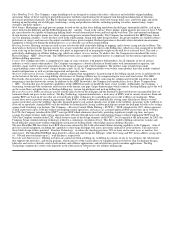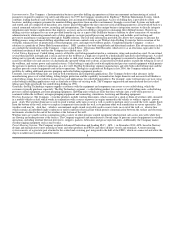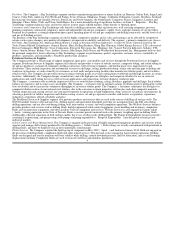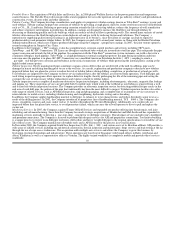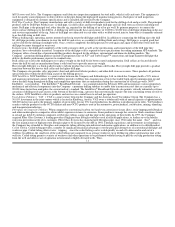National Oilwell Varco 2010 Annual Report Download - page 17
Download and view the complete annual report
Please find page 17 of the 2010 National Oilwell Varco annual report below. You can navigate through the pages in the report by either clicking on the pages listed below, or by using the keyword search tool below to find specific information within the annual report.
Engineering and Manufacturing
The manufacturing processes for the Companys products generally consist of machining, welding and fabrication, heat treating, assembly of
manufactured and purchased components and testing. Most equipment is manufactured primarily from alloy steel, and the availability and price
of alloy steel castings, forgings, purchased components and bar stock is critical to the production and timing of shipments. Primary
manufacturing facilities for the Rig Technology segment are located in Houston, Galena Park, Sugar Land, Conroe, Cedar Park, Anderson, Fort
Worth and Pampa, Texas; Duncan, Oklahoma; Orange, California; Edmonton, Canada; Aberdeen, Scotland; Kristiansand, Stavanger and
Arendal, Norway; Etten-Leur and Groot-Ammers, the Netherlands; Carquefou, France; Singapore; Lanzhou and Shanghai, China; Dubai, UAE;
and Ulsan, South Korea.
The Petroleum Services & Supplies segment manufactures or assembles the equipment and products which it rents and sells to customers, and
which it uses in providing services. Downhole tools are manufactured at facilities in Houston, Texas; Manchester, England; Dubai, UAE; and
Singapore. Drill Bits are manufactured at facilities in Conroe, Texas; Stonehouse, U.K; and Jurong, Singapore. Drill Stem technology
development and drill pipe are manufactured at facilities in Navasota, Texas; Veracruz, Mexico; Jurong, Singapore; and Baimi Town, Jiangyan
and Jiangsu, China. Solids control equipment and screens are manufactured at facilities in Houston and Conroe, Texas; New Iberia, Louisiana;
Aberdeen, Scotland; Trinidad; Shah Alum and Puncak Alam, Malaysia; and Macae, Brazil. Pumps are manufactured at facilities in Houston,
Odessa and Marble Falls, Texas; McAlester and Tulsa, Oklahoma; Manchester and Newcastle, England; Melbourne, Australia; and Buenos
Aires, Argentina. NOV IntelliServ manufactures or assembles equipment in Provo, Utah. The Company manufactures tubular inspection
equipment and tools at its Houston, Texas facility for resale, and renovates and repairs equipment at its manufacturing facilities in Houston,
Texas; Celle, Germany; Singapore; and Aberdeen, Scotland. Fiberglass and composite tubulars and fittings are manufactured at facilities in San
Antonio, Texas; Little Rock, Arkansas; Tulsa, Oklahoma; Wichita, Kansas; and Harbin and Suzhou, China, while tubular coatings are
manufactured in its Houston, Texas facility, or through restricted sale agreements with third party manufacturers. Certain of the Companys
manufacturing facilities and certain of the Companys products have various certifications, including, ISO 9001, API, APEX and ASME.
Raw Materials
The Company believes that materials and components used in its servicing and manufacturing operations and purchased for sales are generally
available from multiple sources. The prices paid by the Company for its raw materials may be affected by, among other things, energy, steel and
other commodity prices; tariffs and duties on imported materials; and foreign currency exchange rates. In 2006 and 2007, the price for mild steel
and standard grades stabilized while specialty alloy prices continued to rise driven primarily by escalation in the price of the alloying agents.
However, toward the end of 2007, the Company began to see price escalations in all grades of steel that continued into 2008. During 2008, steel
prices stabilized and the Company began to experience some declines in steel prices late in 2008 and throughout 2009. The Company has
generally been successful in its effort to mitigate the financial impact of higher raw materials costs on its operations by applying surcharges to
and adjusting prices on the products it sells. Furthermore, the Company continued to expand its supply base in 2006, 2007 and 2008 throughout
the world to address its customers needs. In 2010, the Company witnessed flat to slight increases in steel pricing. The Company anticipates
higher steel pricing across the board in 2011. Higher prices and lower availability of steel and other raw materials the Company uses in its
business may adversely impact future periods.
Backlog
The Company monitors its backlog of orders within its Rig Technology segment to guide its planning. Backlog includes orders greater than
$250,000 for most items and orders for wireline units in excess of $75,000, and which require more than three months to manufacture and
deliver.
Backlog measurements are made on the basis of written orders which are firm, but may be defaulted upon by the customer in some instances.
Most require reimbursement to the Company for costs incurred in such an event. There can be no assurance that the backlog amounts will
ultimately be realized as revenue, or that the Company will earn a profit on backlog work. Our backlog for equipment at December 31, 2010,
2009 and 2008 was $5.0 billion, $6.4 billion and $11.1 billion, respectively.
Employees
At December 31, 2010, the Company had a total of 41,027 employees, of which 5,443 were temporary employees. Approximately 117 employees
in the Companys fiberglass tubulars plant in Little Rock, Arkansas, and 152 employees of the Companys downhole tools product line in
Houston and Conroe, Texas, are subject to collective bargaining agreements. Additionally, certain of the Companys employees in various
foreign locations are subject to collective bargaining agreements. 17


